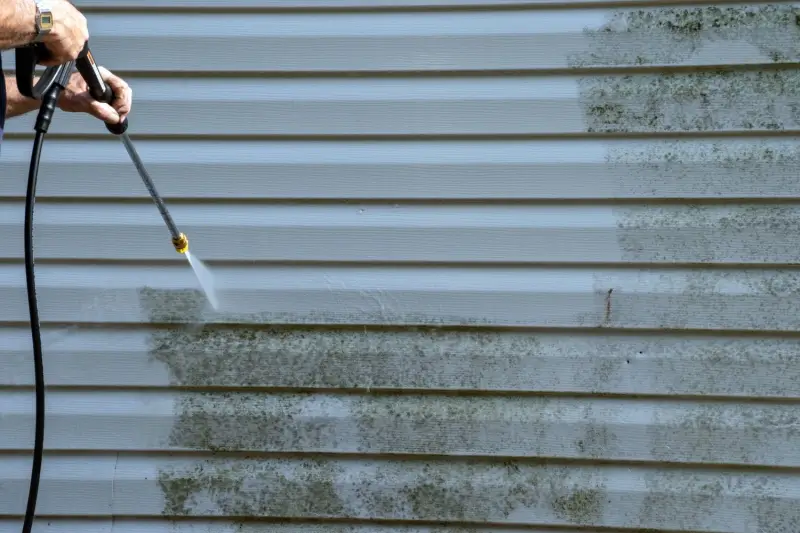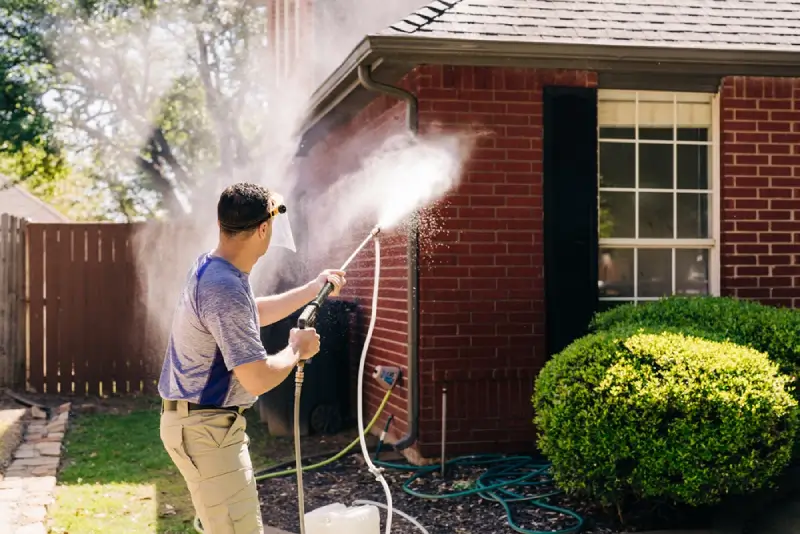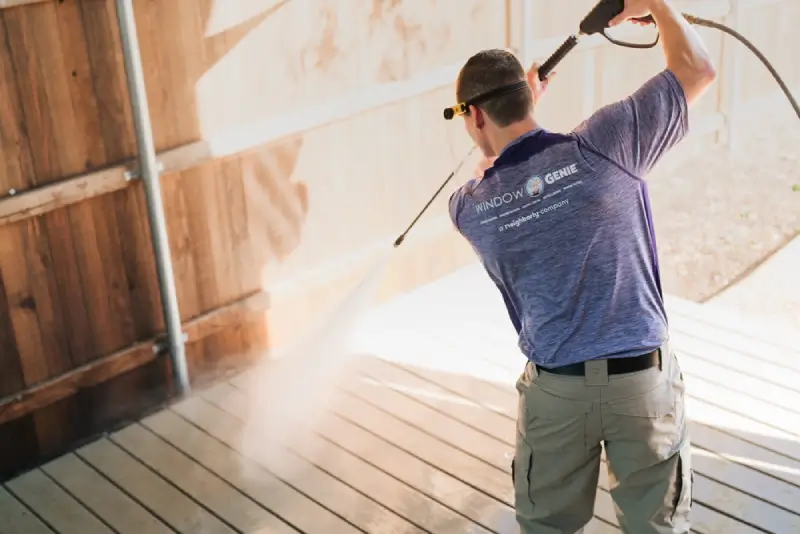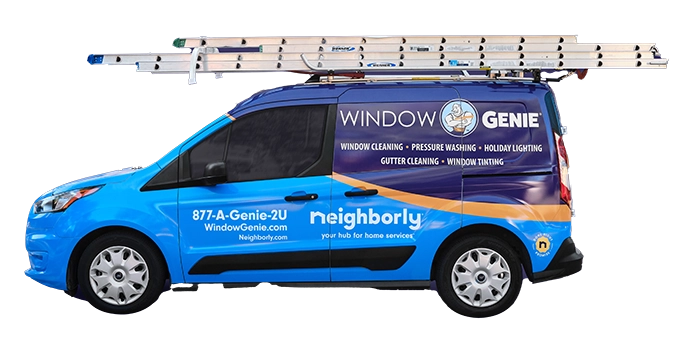
Upping the curb appeal of your property isn't just about planting flowers and bushes. A freshly pressure-washed exterior really shows off your house. Pressure washing also removes built-up dirt, grime, and even algae that can damage the exterior of your home over time.
But how often should you pressure wash? There's no one-size-fits-all answer – it depends on a few things. Whether it’s your first experience with pressure washing or power washing, we’re here to help you determine the perfect pressure washing schedule for your home.
Table of Contents:
Customizing Your Pressure Washing Plan
Have all your pressure washing supplies ready but not sure how to get started and when it’ll be time to pressure wash your house again? Use this guide to help you determine the best house washing methods, how to clean different exterior types, and create a schedule that makes sense for your home.
Exterior Types and How to Clean Them
No matter what your home exterior is made of, there’s a custom pressure washing approach to bring it back to life.
Vinyl, Metal, or Composite Siding: These non-porous materials are generally the most forgiving when it comes to pressure washing siding. However, to ensure your siding remains pristine, it's essential to use the correct approach.
- Spray Pattern: Opt for a fan-tip nozzle. This distributes the water evenly over a wider area, reducing the risk of damaging the siding. Avoid using a concentrated spray, as this can cause dents or scratches.
- Pressure Level: For vinyl, metal, and composite siding, a pressure level between 1200 and 1500 PSI is generally safe. Always start with a lower pressure and gradually increase it if needed. Excessive pressure can damage the siding, especially for vinyl.
- Wash Solution: A simple mixture of detergent and water is often sufficient for removing dirt and grime. For stubborn stains, you may need a stronger cleaning solution.
Wood Siding: Wood siding requires a gentler approach compared to other materials. Excessive pressure can damage the wood fibers, leading to warping, cracking, or paint peeling.
- Spray Pattern: A wide-angle fan tip nozzle is essential to distribute the water evenly. Avoid concentrated sprays that can penetrate the wood.
- Pressure Level: A low pressure setting, around 800 to 1200 PSI, is recommended for wood siding. Always test the pressure on a small, inconspicuous area before proceeding.
- Wash Solution: A mixture of mild detergent and water is usually sufficient. For stubborn stains, consider using a biodegradable cleaner specifically designed for wood. Avoid harsh chemicals that can damage the wood's finish.
Brick Exteriors: Brick is a durable material that can withstand pressure washing effectively. However, for heavily soiled brick, a combination of pressure washing and a cleaning solution might be necessary.
- Spray Pattern: A fan-tip nozzle is generally suitable for brick. It provides enough power to remove dirt and grime without damaging the brick. Avoid using a concentrated spray, as this can potentially erode the mortar.
- Pressure Level: A pressure level between 1200 and 1500 PSI is usually safe for brick. However, always start with a lower pressure and gradually increase it if needed. Overly high pressure can damage the mortar.
- Wash Solution: For lightly soiled brick, a simple detergent and water solution might do the job. For heavier stains, you may need a stronger cleaning solution (muriatic acid-free) specifically designed for brick.

Stucco: Since stucco is a porous material, it requires a delicate touch when pressure washing. High pressure can damage the surface and cause water penetration.
- Spray Pattern: A wide-angle fan tip nozzle is essential for stucco. This distributes the water evenly and reduces the risk of damage. Avoid concentrated sprays that can erode the stucco.
- Pressure Level: A low-pressure setting, around 800 to 1200 PSI, is recommended for stucco. Always start with the lowest pressure and gradually increase it if needed. Overly high pressure can damage the stucco and potentially cause water to seep into the walls.
- Wash Solution: A mild detergent and water solution is generally sufficient for cleaning stucco. For stubborn stains or organic growth, you may need a stronger cleaning solution specifically designed for stucco.
Level of Pollution and Environmental Factors
Your home exterior is put to the test by the elements. Pollution, humidity and even pollen from the seasonal changes, leave dirt and grime on your exterior. How often you need to turn to the pressure washer depends to a large part on where you live and the environmental factors your home is exposed to.
Region and Weather Conditions
Humid vs. Dry Climates:
- Coastal: Salt air is particularly damaging to home exteriors. Homes in coastal areas need to regularly remove salt buildup, so go ahead and add a pressure washing session to your calendar every 3 months.
- Humid Climates: Think lush greenery, frequent rain, and high humidity. Conditions like these can create a breeding ground for organic growth. Homes in humid regions, like the Southeast US, benefit from more frequent pressure washing (not just once a year), ideally every 6 to 8 months.
- Dry Climates: Arid regions experience less rain and higher dust levels. While dirt and grime build-up can still occur, the growth of organic matter on your exterior walls happens at a slower pace compared to humid areas. For homes in dry climates like the Southwest US, annual pressure washing is typically the best route.
Rural vs. Urban Environments:
- Rural Areas: Surrounded by trees? You might deal with tree sap, pollen, and bird droppings regularly, which can leave noticeable marks on your exterior. Depending on the severity, consider pressure washing once or twice a year.
- Urban Areas: Traffic fumes, exhaust, and general pollution can accumulate quickly on houses in urban areas. Contaminants like these can dull your home's exterior so planning pressure washing once a year can help maintain a clean and fresh look.
Best Times of Year for Pressure Washing
A thorough pressure washing session can be so satisfying. But what’s the best time of year to bring out your equipment? The ideal temperature for a sparkling clean exterior is a comfortable 40-75 degrees Fahrenheit. Too hot, and the water evaporates before it can work its magic, leaving unsightly streaks. Too cold, and you risk damaging your exterior with freezing water.
Spring Cleaning: Springtime is the perfect time to hit the reset button on your home's curb appeal. After a long winter of battling snow and ice, your siding has likely accumulated a layer of salt, grime, and dirt. Plus, with the warmer weather, cleaning solutions have plenty of time to break down grime before drying.
Fall Prep: As summer fades into fall, pollen, dust, and pesky bird droppings begin to accumulate on your home's exterior. Fall pressure washing is like giving your home a protective coat before winter's chill sets in. By removing organic matter (and all that pollen), you're helping to prevent further growth, ensuring your home stays in top shape throughout the colder months.
How to Pressure Wash Different Parts of Your House
You already know that pressure washing is a powerful tool for cleaning your home's exterior walls. There is much more to your property than the walls that create your living space. From your deck or patio, you can also use your pressure washer to clean your roof and gutter, and more.
Before getting started, it’s good to know some basics and follow tips to avoid when pressure washing your home.
Decks and Patios
Since a high-pressure setting can damage wood or concrete, make sure to use a low-pressure setting and a wide spray pattern. For stubborn grime, consider following instructions of a deck cleaning solution before pressure washing.

Roofs and Gutters
Start with a low-pressure setting to avoid damaging your roof’s shingles or gutters. Use a fan spray pattern to clean the overhangs, then switch to a narrow spray to clear debris from the gutters.
Driveways and Walkways
To see the best results, use a high-pressure setting, work in sections, and maintain a steady spray pattern (without etching the concrete). If you need to clean oil and grease from your concrete, an alkaline cleaner can help.
Remember: Safety first –- always wear protective gear like goggles, gloves, and long pants when pressure washing.
The Pros and Cons of DIY vs Professional Pressure Washing Services
Pressure washing your home can be a rewarding task, but it's important to weigh the pros and cons of doing it yourself versus hiring a professional service. To help you decide, remember to think about:
Cost Considerations
Tackling this job yourself can seem like a budget-friendly win. You'll need to rent a pressure washer (or maybe splurge on a new one) and depending on the state of your home exterior, grab the appropriate cleaning supplies. Plus, let's not forget your time and energy. What seems like an hour of work could easily turn into a weekend project.
Hiring a professional? Expect to pay by the hour or be charged a flat fee. The good news is, there are no surprises or hidden fees. Most professional pressure washing companies give you a price upfront, so you know exactly what you're in for before they even start spraying.
Safety and Risk Factors
Be careful when you tackle pressure washing yourself. A single mishap could lead to more than just a clean house. You risk injuries like cuts and bruises, or worse. Plus, your home's exterior is vulnerable. Incorrect pressure washing can damage your siding, windows, and roof, potentially resulting in costly repairs.
Want to relax and let someone else handle the grime? Hiring a professional pressure cleaning company means peace of mind comes standard. They are skilled and prepared to handle the powerful equipment without hurting themselves or your property. And since any reputable business is insured, you are covered in case of any incidental damage.
Quality of Results
Don’t compromise on a quality clean. A rushed DIY pressure washing job might end in a patchwork of clean spots mixed in with still-dirty areas. Getting that perfect, even look is not as easy as the many videos on social media make it seem.
Want a guaranteed good-looking result? A pressure washing professional has the power (and the knowledge) to transform your grimy before to a sparkling after. Thanks to years of experience, their highly trained eye won’t miss a spot and will alert you to address any trouble spots, like loose siding or unsightly growth, before they become bigger problems.
Benefits of Regular Pressure Washing
Regular pressure washing offers a surprising range of benefits for your property that goes beyond the obvious clean.
Prevent Small Issues from Turning into Big Damage
Built-up debris can prevent water from draining properly. Standing water can cause roof leaks, foundation problems, and can even erode concrete surfaces over time.
Health Benefits
Pollen and other environmental pollutants can accumulate on your home's exterior and create habitats for spiders and other creepy crawlers. Regular pressure washing removes irritants and washes away cooks and crannies, improving the overall air quality around your home.
Boost Your Curb Appeal with Window Genie
Whether you're aiming to boost curb appeal, prevent costly repairs, or create a healthier living environment, trust Window Genie® with your pressure washing needs. We will work with you to create a customized cleaning plan to power wash your property on a schedule that makes for your home. Schedule a free consultation and learn why others trust us with their pressure washing needs and what it means when Window Genie service professionals share that all work is backed by the Neighborly Done Right Promise®.
This article is intended for general guidance only and is not applicable to every situation. You are responsible for determining the proper course of action for your property and situation. Window Genie is not responsible for any damages that occur as a result of advice and/or guidance derived from its blog content. Window Genie services may vary by location. For the most accurate guidance, contact the Window Genie nearest you for more information and a professional on-site assessment.
